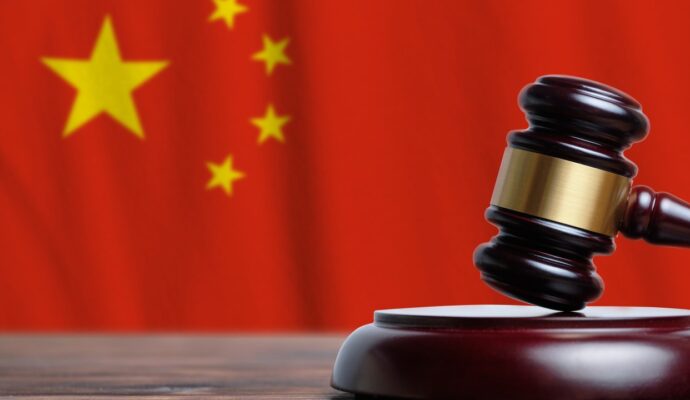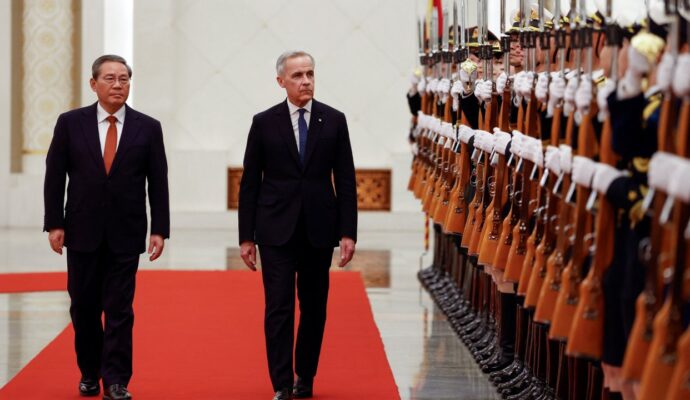The letter was effusively polite, the allegations anything but.
“We have the honour to address you,” the seven United Nations special rapporteurs began their correspondence to the head of Jiangsu Guotai Guosheng garment factory in China’s Xinjiang province.
The 2021 letter then detailed allegations of brutal working conditions for members of China’s Uyghur minority, reportedly forcibly transported hundreds of kilometres and arbitrarily detained for re-education and forced labour.
“Workers are reportedly required to work in fenced-in factories … allegedly exposed to intimidation, coercion, threats, and restriction on their freedom of movement, and are subjected to surveillance by security personnel and through digital tools.”
The UN experts asked for more information about their “grave concerns”.
“The alleged forced detention and labour of members of the Uyghur minority and their living conditions may amount to torture or other degrading, cruel or inhuman treatment,” they wrote.
There was no response.
Four years later, the letter to Guotai is now a part of a federal court case brought by the Australian Uyghur Tangritagh Women’s Association (AUTWA) against the retailer Kmart, seeking preliminary discovery of documents relating to Kmart’s supply chains and potential links to forced labour in the Uyghur homeland, known as Xinjiang or East Turkestan.
Guotai appears on Kmart’s 2025 factory list.
Kmart insists it has no connection to forced labour.
Guotai not only appears on Kmart’s factory list: the company or its parent is present in at least four lists publicly reported in Australia, including Target (which is owned, like Kmart, by Wesfarmers), Big W (owned by Woolworths) and Fast Retailing, the company behind Uniqlo.
There is no prohibition on using Guotai as a supplier.
Australia’s modern slavery laws only require that companies report on their supply chains. And if they fail to report, there is no penalty.
‘Businesses must do more’
In 2023 the former ombudsman Prof John McMillan led a review into Australia’s nascent Modern Slavery Act. His report found a “widely endorsed view … that there is no hard evidence that the Modern Slavery Act, in its early years, has yet caused meaningful change for people living in conditions of modern slavery”.
Key among his 30 recommendations was that the act be updated and strengthened to include: an obligation that companies must address modern slavery risks in their supply chains, not simply report on them; penalties for companies that fail to comply; and high-risk declarations for regions, factories or suppliers where the risk of modern slavery is severe.
The government did not respond until December 2024: key recommendations have not yet been implemented. The government released a consultation paper in July.
Sign up: AU Breaking News email
Once billed as world-leading, Australia’s now seven-year-old Modern Slavery Act risks becoming a global laggard, anti-slavery advocates say.
Unlike comparable jurisdictions, such as the US and EU, Australia has no ban on imports linked to forced labour, nor does it require companies to act on modern slavery risks – only to report them.
In the wake of the Kmart federal court case, Australia’s anti-slavery commissioner, the former Labor senator Chris Evans, said the systematic use of forced labour in Xinjiang was well-documented.
“Australian businesses must do more to understand their supply chains and take action to address known risks,” he said.
“The Australian government must also do more to support them.”
Evans said while other countries had introduced measures such as high-risk product lists and import bans, Australia had not.
“We need better public access to information and data about which products are high risk, what products are entering Australia, and who is importing them.”
The attorney general, Michelle Rowland, tells Guardian Australia the government is “committed to combatting modern slavery in all its forms”, saying its immediate priority is responding to the McMillan review, starting a public consultation and monitoring international developments.
“These will inform the development of balanced measures to support and incentivise Australian businesses to take actions to eliminate modern slavery risks and practices, and combat them in their supply chains,” she says.
‘Alarm bells ringing’
Ramila Chanisheff, the AUTWA president, says the court action against Kmart seeks to create “transparency”.
“The state-sanctioned mass imprisonment, repression and forced labour of Uyghur people is a known phenomenon,” she tells Guardian Australia.
“We’re demanding answers from Kmart so we know whether its actions live up to its words about addressing forced labour risks in its supply chain.”
The best public interest journalism relies on first-hand accounts from people in the know.
If you have something to share on this subject you can contact us confidentially using the following methods.
Secure Messaging in the Guardian app
The Guardian app has a tool to send tips about stories. Messages are end to end encrypted and concealed within the routine activity that every Guardian mobile app performs. This prevents an observer from knowing that you are communicating with us at all, let alone what is being said.
If you don’t already have the Guardian app, download it (iOS/Android) and go to the menu. Select ‘Secure Messaging’.
SecureDrop, instant messengers, email, telephone and post
If you can safely use the tor network without being observed or monitored you can send messages and documents to the Guardian via our SecureDrop platform.
Finally, our guide at theguardian.com/tips lists several ways to contact us securely, and discusses the pros and cons of each.
","image":"https://i.guim.co.uk/img/media/ae475ccca7c94a4565f6b500a485479f08098383/788_0_4000_4000/4000.jpg?width=620&quality=85&auto=format&fit=max&s=45fd162100b331bf1618e364c5c69452","credit":"Illustration: Guardian Design / Rich Cousins"}”>
Quick GuideContact us about this story
Show

The best public interest journalism relies on first-hand accounts from people in the know.
If you have something to share on this subject you can contact us confidentially using the following methods.
Secure Messaging in the Guardian app
The Guardian app has a tool to send tips about stories. Messages are end to end encrypted and concealed within the routine activity that every Guardian mobile app performs. This prevents an observer from knowing that you are communicating with us at all, let alone what is being said.
If you don’t already have the Guardian app, download it (iOS/Android) and go to the menu. Select ‘Secure Messaging’.
SecureDrop, instant messengers, email, telephone and post
If you can safely use the tor network without being observed or monitored you can send messages and documents to the Guardian via our SecureDrop platform.
Finally, our guide at theguardian.com/tips lists several ways to contact us securely, and discusses the pros and cons of each.
Chanisheff says every member of Australia’s tight-knit Uyghur community has been affected. Some have not been able to speak to relatives for years, and don’t know where they are, others censor their contact for fear of retribution.
“Our community has lost family members, friends and loved ones because of China’s brutal treatment of Uyghurs,” she says.
“Kmart is a go-to store for so many people in Australia. If the company has profited in any way from this sort of systematic repression, I am sure Australians would be horrified.”
after newsletter promotion
Kmart said it was “disappointed” AUTWA had chosen to launch court action, saying: “At no point has the AUTWA engaged with Kmart to explain or identify any specific alleged inadequacies.” Kmart said it had offered to meet AUTWA on several occasions.
“Kmart is committed to respecting human rights in our operations and supply chains,” a spokesperson said.
“Transparency is a key principle of our Ethical Sourcing Program. Kmart publicly discloses its Factory List on its website and was the first Australian retailer to do so.”
The retailer said it invited feedback on its approach to ethical sourcing and investigated any concerns about its operations and supply chains.
The ethical sourcing program, “which helps us to identify and mitigate modern slavery risks”, had been in place for more than 15 years, the spokesperson said.
On Baptist World Aid’s Ethical Fashion Guide, Kmart scores 58/100, putting it in the top 20% of more than 450 brands.
But Freya Dinshaw, associate legal director at the Human Rights Law Centre, said “alarm bells have been ringing for a long time” over the risk of forced labour in the Chinese garment sector.
“This court case is about Kmart coming clean on whether it is really doing everything it claims to be doing to ensure that its products are slavery free,” she said.
Dinshaw said the case also highlighted weaknesses in Australia’s modern slavery laws.
“It shouldn’t be left to members of the public to take companies to court and force them to open their books where there are suspicions of links to modern slavery,” she said.
“Buying clothes should never come at the expense of someone else’s freedom.”
‘Fast-moving crime’
The anti-slavery campaigners Fuzz and Carolyn Kitto, co-directors of Be Slavery Free, argue that the fight against the “fast-moving crime” of modern slavery requires constant evolution.
“Modern slavery doesn’t stay still,” Fuzz Kitto tells the Guardian. “In our estimation … about 30,000 new people every single day are being caught in slavery. And we can get out about 180 a day: 30,000 in, 180 out.”
Forced labour practices are fluid, designed to escape detection, he says: audits of factories are often announced in advance; selected respondents can be coached in their answers; and “ghost” factories are set up solely for the purpose of being audited.
But technology is allowing the anti-slavery campaign to compete.
Tools such as Million Makers allow factory workers to report on their conditions through their smartphones – with the information going directly to independent servers. Workers are paid a day’s wage for their responses: at some factories between 80% and 100% of workers have provided information.
Other tools, including SourceCertain and Oritain, can detect the origin of products – from chocolate bars to blended cotton garments – tracing the source of goods through layers of intermediaries.
The Kittos argue Australia’s laws should mandate a “due diligence” model, obliging companies not only to report on their supply chains, but act on slavery risks if identified.
Fiona David, founder of Fair Futures and one of the creators of the Global Slavery Index, said Australia’s modern slavery laws urgently needed strengthening to ban the import of goods made with forced labour.
“It’s unacceptable that in Australia at the moment, there is nothing to stop or prohibit people from importing goods into Australia that have been made or that have been suspected to have been made by forced labour,” she said.
“Many people would be surprised to learn that there are no restrictions on importing products that have been made by forced labour into Australia.”
David said Australia’s legislation needed to move beyond “a regime that focuses all of corporate effort on writing reports about modern slavery, and shift attention to actions required by companies and outcomes”.
“At the moment the government is leaving it to each business individually to work out what it thinks is responsible business when it comes to labour risks. We have a situation where unscrupulous companies actually benefit by getting away with doing the wrong thing.”
Do you know more? Contact ben.doherty@theguardian.com


